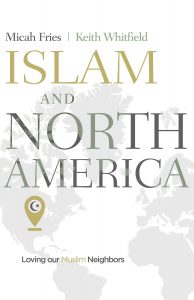
Take a look around you. Chances are, you’ve recently seen a woman in a hijab shopping in the grocery store, a Muslim family picnicking in a nearby park, or noticed a mosque across town. As of 2015, there were 1.8 billion Muslims in the world and 3.3 million Muslims living in the United States. These numbers are expected to rise in the next decade (20, 28). Consequently, the need for mission-minded Christians to consider how to reach their Muslim friends only grows more urgent.
Into this milieu, Micah Fries and Keith Whitfield’s 175-page edited volume Islam and North America (B&H, available November 1) aims to prepare “the church to know and love our Muslim friends and neighbors, and to help you learn how to personally declare and display the gospel of Jesus to them” (xvii). There is always more work to be done to prepare the church for its mission, but this little book does its part to help.
While the intended audience for this volume is Christians in North America, it’s also helpful for Christians serving overseas. I think Islam and North America offers four unique opportunities to Christians who are taking the gospel to Muslims—both in America and around the globe.
The Opportunity for Self-Reflection
What do you get when you take an American Christian out of America? An American Christian. That’s not a bad thing either. All humans—including missionaries—are culturally located and culturally influenced. Even as missionaries are formed in new ways by a new culture, they carry with them the formative heritage of their home culture.
In the case of American Christians and Islam, our home culture may have laden us with baggage that travels with us to our new contexts. Islam and North America lovingly offers the opportunity to address some of those concerns, discussing topics like religious liberty, Muslim holy war, and sharia law.
Sometimes it can be difficult for missionaries to recognize the cultural baggage they carry with them, but as a wise missionary once told me, “You’ll be defined as much by what you put down as what you pick up.” This book helps American missionaries consider—and perhaps correct—some of the lingering questions and concerns they may have about their Muslim neighbors.
The Opportunity for Theological Reflection
If you ask ten missionaries for a list of common concerns Muslims have about Christianity, ten out of ten lists will include the doctrine of the Trinity. In my time serving overseas, I was ill-prepared to answer the in-depth Trinitarian questions my Muslim friends consistently asked me.
In the chapter “Do Christians and Muslims Worship the Same God?” Keith Whitfield walks his readers through an accessible, orthodox treatment of the centrality of the Trinity in the Christian gospel. Discussions about the Trinity can feel daunting or reserved for an elite class of theologians. As Whitfield shows, though, the Christian gospel is inherently Trinitarian. As such, this book provides an opportunity to reflect on who God is and what he has done.
For those currently working with Muslims, no doubt this reflection will better prepare them to answer some of the hard questions. More than that, though, it provides an opportunity to remember and stand in awe of the good news that the Father sent the Son to save us in him by the power of the Spirit.
The Opportunity for Missiological Reflection
At its heart, Islam and North America is a missiological book and thus provides ample opportunity for Christians ministering cross-culturally to exam their own practices and learn from the practices of others. To name a few,
- Ed Stetzer’s practical helps for multifaith dialogue provide a guide for engaging with people from different faiths, which is immediately relevant for missionaries in any context.
- D. A. Horton’s chapter addressing the “disconnection,” “dichotomy,” and “desensitization” that must be overcome to engage our Muslim neighbors gives a framework for missionaries to consider their own attitudes and practices.
- Ant Greenham’s chapter “Muslims and the Great Commission” offers an in-depth look at the role of community in Muslim life and the need for community in the lives of Muslim background believers. This chapter provides fertile ground for mission strategists to consider their own church-planting methodologies.
The Opportunity for Encouragement
Finally, this book offers deep-hearted encouragement to our brothers and sisters who pour out their lives to see Muslims come to faith. Some may have been toiling for years, sowing seeds of the gospel among an unresponsive people. Islam and North America reminds readers to take heart, for God is bringing the dead to life. He is reconciling Muslims to himself in Christ.
This book is peppered with testimonies of Muslims coming to faith. None rings more strongly than Kambiz Saghaey’s journey from an “angry Islamic man” (ix), to Christian, to persecuted pastor, to theological educator. For those growing weary in the task, be encouraged! God can do the same work in the hearts of your neighbors and friends as he did in Kambiz.
I heartily recommend this book to Christians in North America and Americans serving around the globe. I’m grateful for the work Micah Fries, Keith Whitfield, and all of the contributors put in to provide this useful resource to the church.
Christy Thornton is currently pursuing a PhD in systematic theology from Southeastern Baptist Theological Seminary. She is passionate about leading others to know and love God and participate in his mission in the world. She has had the privilege to serve internationally among unreached people groups, and stateside in local churches in a number of capacities. She is currently a member of The Summit Church in Raleigh, North Carolina.

